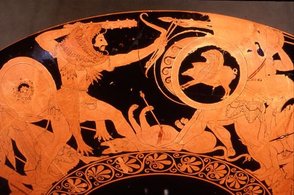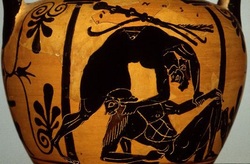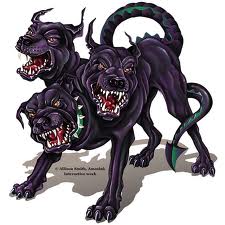The Great Labors of Hercules
The Cattle of Geryon

"To accomplish his tenth labor, Hercules had to journey to the end of the world. Eurystheus ordered the hero to bring him the cattle of the monster Geryon. Geryon was the son of Chrysaor and Callirrhoe. Chrysaor had sprung from the body of the Gorgon Medusa after Perseus beheaded her, and Callirrhoe was the daughter of two Titans, Oceanus and Tethys. With such distinguished lineage, it is no surprise that Geryon himself was quite unique. It seems that Geryon had three heads and three sets of legs all joined at the waist. Geryon lived on an island called Erythia, which was near the boundary of Europe and Libya. On this island, Geryon kept a herd of red cattle guarded by Cerberus's brother, Orthus, a two-headed hound, and the herdsman Eurytion. Hercules set off on for Erythia, encountering and promptly killing many wild beasts along the way, and he came to the place where Libya met Europe. Here, Apollodorus tells us, Hercules built two massive mountains, one in Europe and one in Libya, to commemorate his extensive journey. Other accounts say that Hercules split one mountain into two. Either way, these mountains became known as the Gates or Pillars of Hercules. The strait Hercules made when he broke the mountain apart is now called the Strait of Gibraltar, between Spain and Morocco, the gateway from the Mediterranean Sea to the Atlantic Ocean.Sailing in a goblet which the Sun gave him in admiration, Hercules reached the island of Erythia. Not long after he arrived, Orthus, the two-headed dog, attacked Hercules, so Hercules bashed him with his club. Eurytion followed, with the same result. Another herdsman in the area reported these events to Geryon. Just as Hercules was escaping with the cattle, Geryon attacked him. Hercules fought with him and shot him dead with his arrows. The stealing of the cattle was not such a difficult task, compared to the trouble Hercules had bringing the herd back to Greece. In Liguria, two sons of Poseidon, the god of the sea, tried to steal the cattle, so he killed them. At Rhegium, a bull got loose and jumped into the sea. The bull swam to Sicily and then made its way to the neighboring country. The native word for bull was "italus," and so the country came to be named after the bull, and was called Italy.The escaped bull was found by a ruler named Eryx, another of Poseidon's sons, and Eryx put this bull into his own herd. Meanwhile, Hercules was searching for the runaway animal. He temporarily entrusted the rest of the herd to the god Hephaestus, and went after the bull. He found it in Eryx's herd, but the king would return it only if the hero could beat him in a wrestling contest. Never one to shy away from competition, Hercules beat Eryx three times in wrestling, killed the king, took back the bull, and returned it to the herd. Hercules made it to the edge of the Ionian Sea, with the end of his journey finally in sight. Hera, however, was not about to let the hero accomplish this labor. She sent a gadfly to attack the cattle, and the herd scattered far and wide. Now, Hercules had to run around Thrace gathering the escaped cows. Finally, he regrouped the herd and, blaming his troubles on the river Strymon in Thrace, he filled the river with rocks, making it unnavigable. Then, he brought the cattle of Geryon to Eurystheus, who sacrificed the herd to Hera. The ancients don't tell us how long either Hercules or Europe took to recover from this eventful jaunt."(http://www.perseus.tufts.edu/Herakles/cattle.html)
The Apples of the Hesperides

"Poor Hercules! After eight years and one month, after performing ten superhuman labors, he was still not off the hook. Eurystheus demanded two more labors from the hero, since he did not count thehydra or the Augean stables as properly done. Eurystheus commanded Hercules to bring him golden apples which belonged to Zeus, king of the gods. Hera had given these apples to Zeus as a wedding gift, so surely this task was impossible. Hera, who didn't want to see Hercules succeed, would never permit him to steal one of her prize possessions, would she? These apples were kept in a garden at the northern edge of the world, and they were guarded not only by a hundred-headed dragon, named Ladon, but also by the Hesperides, nymphs who were daughters of Atlas, the titan who held the sky and the earth upon his shoulders. Hercules' first problem was that he didn't know where the garden was. He journeyed through Libya, Egypt, Arabia, and Asia, having adventures along the way. He was stopped by Kyknos, the son of the war god, Ares, who demanded that Hercules fight him. After the fight was broken up by a thunderbolt, Hercules continued on to Illyria, where he seized the sea-god Nereus, who knew the garden's secret location. Nereus transformed himself into all kinds of shapes,trying to escape, but Hercules held tight and didn't release Nereus until he got the information he needed. Continuing on his quest, Hercules was stopped by Antaeus, the son of the sea god, Poseidon, who also challenged Hercules to fight. Hercules defeated him in a wrestling match, lifting him off the ground and crushing him, because when Antaeus touched the earth he became stronger. After that, Hercules met up with Busiris, another of Poseidon's sons, was captured, and was led to an altar to be a human sacrifice. But Hercules escaped, killing Busiris, and journeyed on. Hercules came to the rock on Mount Caucasus where Prometheus was chained. Prometheus, a trickster who made fun of the gods and stole the secret of fire from them, was sentenced by Zeus to a horrible fate. He was bound to the mountain, and every day a monstrous eagle came and ate his liver, pecking away at Prometheus' tortured body. After the eagle flew off, Prometheus' liver grew back, and the next day he had to endure the eagle's painful visit all over again. This went on for 30 years, until Hercules showed up and killed the eagle. In gratitude, Prometheus told Hercules the secret to getting the apples. He would have to send Atlas after them, instead of going himself. Atlas hated holding up the sky and the earth so much that he would agree to the task of fetching the apples, in order to pass his burden over to Hercules. Everything happened as Prometheus had predicted, and Atlas went to get the apples while Hercules was stuck in Atlas's place, with the weight of the world literally on his shoulders. When Atlas returned with the golden apples, he told Hercules he would take them to Eurystheus himself, and asked Hercules to stay there and hold the heavy load for the rest of time. Hercules slyly agreed, but asked Atlas whether he could take it back again, just for a moment, while the hero put some soft padding on his shoulders to help him bear the weight of the sky and the earth. Atlas put the apples on the ground, and lifted the burden onto his own shoulders. And so Hercules picked up the apples and quickly ran off, carrying them back, uneventfully, to Eurystheus.There was one final problem: because they belonged to the gods, the apples could not remain with Eurystheus. After all the trouble Hercules went through to get them, he had to return them to Athena, who took them back to the garden at the northern edge of the world."
(http://www.perseus.tufts.edu/Herakles/apples.html)
(http://www.perseus.tufts.edu/Herakles/apples.html)
Cerberus

"The most dangerous labor of all was the twelfth and final one. Eurystheus ordered Hercules to go to the Underworld and kidnap the beast called Cerberus (or Kerberos). Eurystheus must have been sure Hercules would never succeed at this impossible task!The ancient Greeks believed that after a person died, his or her spirit went to the world below and dwelled for eternity in the depths of the earth. The Underworld was the kingdom of Hades, also called Pluto, and his wife, Persephone. Depending on how a person lived his or her life, they might or might not experience never-ending punishment in Hades. All souls, whether good or bad, were destined for the kingdom of Hades. Cerberus was a vicious beast that guarded the entrance to Hades and kept the living from entering the world of the dead. According to Apollodorus, Cerberus was a strange mixture of creatures: he had three heads of wild dogs, a dragon or serpent for a tail, and heads of snakes all over his back. Hesiod, though, says that Cerberus had fifty heads and devoured raw flesh. Cerberus' parents were the monster Echinda (half-woman, half-serpent) and Typhon (a fire-breathing giant covered with dragons and serpents). Even the gods of Olympus were afraid of Typhon. Among the children attributed to this awful couple were Orthus (or Othros), the Hydra of Lerna, and the Chimaera. Orthus was a two-headed hound which guarded the cattle of Geryon. With the Chimaera, Orthus fathered the Nemean Lion and the Sphinx. The Chimaera was a three-headed fire-breathing monster, part lion, part snake, and part goat. Hercules seemed to have a lot of experience dealing with this family: he killed Orthus, when he stole the cattle of Geryon, and strangled the Nemean Lion. Compared to these unfortunate family members, Cerberus was actually rather lucky. Before making the trip to the Underworld, Hercules decided that he should take some extra precautions. This was, after all, a journey from which no mortal had ever returned. Hercules knew that once in the kingdom of Hades, he might not be allowed to leave and rejoin the living. The hero went to Eleusis and saw Eumolpus, a priest who began what were known as the Eleusinian Mysteries. The mysteries were sacred religious rites which celebrated the myth of Demeter and her daughter Persephone. The ancients believed that those who learned the secrets of the mysteries would have happiness in the Underworld. After the hero met a few conditions of membership, Eumolpus initiated Hercules into the mysteries. Hercules went to a place called Taenarum in Laconia. Through a deep, rocky cave, Hercules made his way down to the Underworld. He encountered monsters, heroes, and ghosts as he made his way through Hades. He even engaged in a wrestling contest! Then, finally, he found Pluto and asked the god for Cerberus. The lord of the Underworld replied that Hercules could indeed take Cerberus with him, but only if he overpowered the beast with nothing more than his own brute strength. A weaponless Hercules set off to find Cerberus. Near the gates of Acheron, one of the five rivers of the Underworld, Hercules encountered Cerberus. Undaunted, the hero threw his strong arms around the beast, perhaps grasping all three heads at once, and wrestled Cerberus into submission. The dragon in the tail of the fierce flesh-eating guard dog bit Hercules, but that did not stop him. Cerberus had to submit to the force of the hero, and Hercules brought Cerberus to Eurystheus. Unlike other monsters that crossed the path of the legendary hero, Cerberus was returned safely to Hades, where he resumed guarding the gateway to the Underworld. Presumably, Hercules inflicted no lasting damage on Cerberus, except, of course, the wound to his pride!"
(http://www.perseus.tufts.edu/Herakles/cerberus.html)
(http://www.perseus.tufts.edu/Herakles/cerberus.html)
